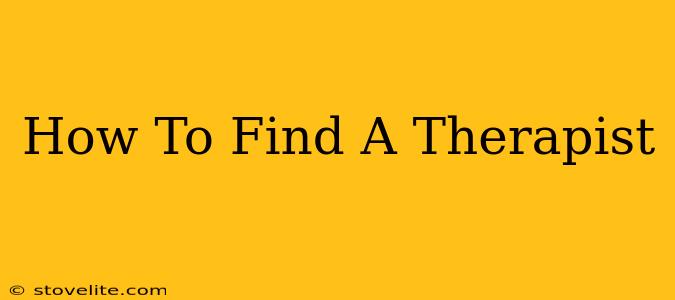Finding the right therapist can feel overwhelming. With so many options and considerations, it's easy to get lost in the process. This guide will walk you through the steps of finding a therapist who truly understands and supports your needs.
Understanding Your Needs
Before you start your search, take some time for self-reflection. Consider the following:
- What are your specific concerns? Are you dealing with anxiety, depression, relationship issues, trauma, or something else? Identifying your primary concerns will help you narrow your search.
- What kind of therapy are you interested in? There are many different types of therapy, such as Cognitive Behavioral Therapy (CBT), Dialectical Behavior Therapy (DBT), psychodynamic therapy, and more. Researching different approaches can help you find a therapist who uses a method that aligns with your preferences.
- What are your preferences in a therapist? Do you prefer a male or female therapist? Do you need someone who specializes in a particular area, like LGBTQ+ issues or addiction? Thinking about your preferences will help you find a better match.
- What is your budget? Therapy can be expensive, so it's important to consider your financial limitations and insurance coverage. Many therapists offer sliding scale fees, which means they adjust their rates based on a client's income.
Where to Start Your Search
Once you have a better understanding of your needs, you can begin your search. Here are several reliable resources:
1. Your Insurance Provider:
- Check your insurance benefits: Most insurance plans offer mental health coverage. Contact your provider to find out which therapists are in-network and what your out-of-pocket costs will be. This is often the most efficient starting point.
2. Online Directories:
- Psychology Today: This website allows you to search for therapists by location, specialty, and insurance. It also provides therapist profiles with information about their experience and approach.
- Zocdoc: Similar to Psychology Today, Zocdoc offers a comprehensive directory of therapists and allows you to book appointments online.
- GoodTherapy: Another reputable online directory that provides profiles and allows you to filter by various criteria.
3. Referrals:
- Ask your doctor or other healthcare professionals: They may be able to recommend a therapist based on your specific needs.
- Talk to friends and family: If you feel comfortable, ask your trusted friends and family if they have any recommendations.
Reviewing Therapist Profiles & Making Contact
When reviewing therapist profiles, pay attention to:
- Specialties: Does the therapist specialize in the areas that are relevant to you?
- Experience: How many years of experience does the therapist have?
- Approach/Modality: What type of therapy do they practice? Does it resonate with you?
- Client Testimonials (if available): While not always available, testimonials can give you insight into the therapist's style and effectiveness.
Don't hesitate to contact multiple therapists to inquire about their services. Many offer brief consultations before committing to ongoing therapy. This is a crucial step to ensure a good fit.
The First Session & Beyond
Your first session is an opportunity to assess the therapeutic relationship. It's perfectly acceptable to:
- Ask questions: Don't be afraid to inquire about their experience, approach, and fees.
- Share your concerns: Openly discuss what's bothering you and how you hope therapy can help.
- Gauge the "fit": Do you feel comfortable and understood by the therapist? Do you feel a connection? Trust your gut feeling.
Finding the right therapist is a process. It may take some time and effort to find the perfect fit, but it's a worthwhile investment in your well-being. Remember, it's okay to try different therapists until you find one that feels right for you. Your mental health is important, and you deserve support.

